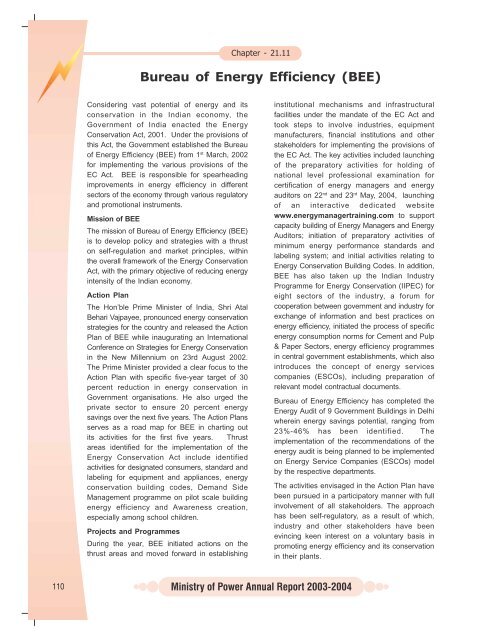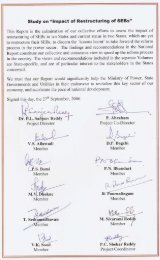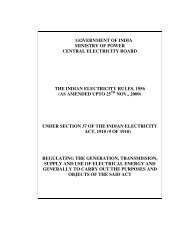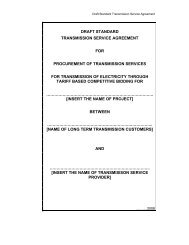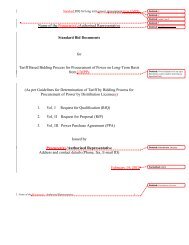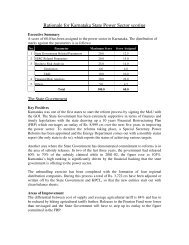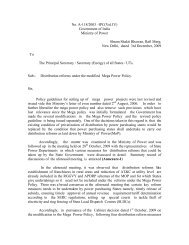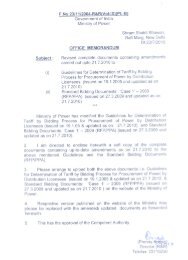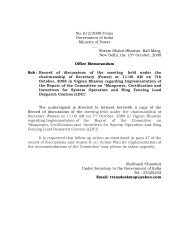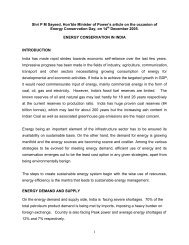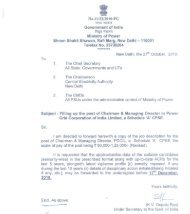Untitled - Ministry of Power
Untitled - Ministry of Power
Untitled - Ministry of Power
You also want an ePaper? Increase the reach of your titles
YUMPU automatically turns print PDFs into web optimized ePapers that Google loves.
110<br />
Bureau <strong>of</strong> Energy Efficiency (BEE)<br />
Considering vast potential <strong>of</strong> energy and its<br />
conservation in the Indian economy, the<br />
Government <strong>of</strong> India enacted the Energy<br />
Conservation Act, 2001. Under the provisions <strong>of</strong><br />
this Act, the Government established the Bureau<br />
<strong>of</strong> Energy Efficiency (BEE) from 1 st March, 2002<br />
for implementing the various provisions <strong>of</strong> the<br />
EC Act. BEE is responsible for spearheading<br />
improvements in energy efficiency in different<br />
sectors <strong>of</strong> the economy through various regulatory<br />
and promotional instruments.<br />
Mission <strong>of</strong> BEE<br />
The mission <strong>of</strong> Bureau <strong>of</strong> Energy Efficiency (BEE)<br />
is to develop policy and strategies with a thrust<br />
on self-regulation and market principles, within<br />
the overall framework <strong>of</strong> the Energy Conservation<br />
Act, with the primary objective <strong>of</strong> reducing energy<br />
intensity <strong>of</strong> the Indian economy.<br />
Action Plan<br />
The Hon’ble Prime Minister <strong>of</strong> India, Shri Atal<br />
Behari Vajpayee, pronounced energy conservation<br />
strategies for the country and released the Action<br />
Plan <strong>of</strong> BEE while inaugurating an International<br />
Conference on Strategies for Energy Conservation<br />
in the New Millennium on 23rd August 2002.<br />
The Prime Minister provided a clear focus to the<br />
Action Plan with specific five-year target <strong>of</strong> 30<br />
percent reduction in energy conservation in<br />
Government organisations. He also urged the<br />
private sector to ensure 20 percent energy<br />
savings over the next five years. The Action Plans<br />
serves as a road map for BEE in charting out<br />
its activities for the first five years. Thrust<br />
areas identified for the implementation <strong>of</strong> the<br />
Energy Conservation Act include identified<br />
activities for designated consumers, standard and<br />
labeling for equipment and appliances, energy<br />
conservation building codes, Demand Side<br />
Management programme on pilot scale building<br />
energy efficiency and Awareness creation,<br />
especially among school children.<br />
Projects and Programmes<br />
During the year, BEE initiated actions on the<br />
thrust areas and moved forward in establishing<br />
Chapter - 21.11<br />
institutional mechanisms and infrastructural<br />
facilities under the mandate <strong>of</strong> the EC Act and<br />
took steps to involve industries, equipment<br />
manufacturers, financial institutions and other<br />
stakeholders for implementing the provisions <strong>of</strong><br />
the EC Act. The key activities included launching<br />
<strong>of</strong> the preparatory activities for holding <strong>of</strong><br />
national level pr<strong>of</strong>essional examination for<br />
certification <strong>of</strong> energy managers and energy<br />
auditors on 22 nd and 23 rd May, 2004, launching<br />
<strong>of</strong> an interactive dedicated website<br />
www.energymanagertraining.com to support<br />
capacity building <strong>of</strong> Energy Managers and Energy<br />
Auditors; initiation <strong>of</strong> preparatory activities <strong>of</strong><br />
minimum energy performance standards and<br />
labeling system; and initial activities relating to<br />
Energy Conservation Building Codes. In addition,<br />
BEE has also taken up the Indian Industry<br />
Programme for Energy Conservation (IIPEC) for<br />
eight sectors <strong>of</strong> the industry, a forum for<br />
cooperation between government and industry for<br />
exchange <strong>of</strong> information and best practices on<br />
energy efficiency, initiated the process <strong>of</strong> specific<br />
energy consumption norms for Cement and Pulp<br />
& Paper Sectors, energy efficiency programmes<br />
in central government establishments, which also<br />
introduces the concept <strong>of</strong> energy services<br />
companies (ESCOs), including preparation <strong>of</strong><br />
relevant model contractual documents.<br />
Bureau <strong>of</strong> Energy Efficiency has completed the<br />
Energy Audit <strong>of</strong> 9 Government Buildings in Delhi<br />
wherein energy savings potential, ranging from<br />
23%-46% has been identified. The<br />
implementation <strong>of</strong> the recommendations <strong>of</strong> the<br />
energy audit is being planned to be implemented<br />
on Energy Service Companies (ESCOs) model<br />
by the respective departments.<br />
The activities envisaged in the Action Plan have<br />
been pursued in a participatory manner with full<br />
involvement <strong>of</strong> all stakeholders. The approach<br />
has been self-regulatory, as a result <strong>of</strong> which,<br />
industry and other stakeholders have been<br />
evincing keen interest on a voluntary basis in<br />
promoting energy efficiency and its conservation<br />
in their plants.


